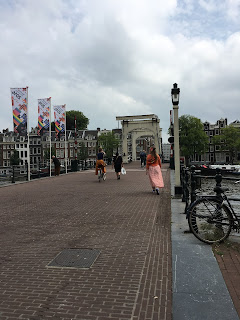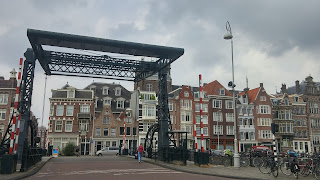We started the day with breakfast in our room as usual. We
have been trying to take it somewhat easy, so we didn’t leave the hotel until
around lunch time. This is a vacation after all, not an assignment.
We had lunch in the Belgian Bakery near to our hotel, Le
Pain Quotidien. Bill ordered the Cobb salad and I ordered the Caesar salad. We
thought we’d share, but it turned out that Bill’s salad was all arugula. I don’t
like it, but Bill can’t eat it at all (past experiences with him violently
vomiting at home and on the street in Seattle eventually confirmed for us to this
suspected allergy). I ate his salad and he ate mine.
 |
| Dutch orange for our last day in Amsterdam. |
We walked to the Dutch Resistance Museum (Museumkaart fully
covers this one too), carrying an umbrella the whole way from the hotel that we
had borrowed, hoping to avoid the freezing cold wet disaster of the day before.
 |
| On our walk to the Resistance Museum we passed by the Amstel Sluices |
 |
| And we crossed over the very famous Magere Brug (Bridge a.k.a. the Skinny Bridge) |
 |
| Bill stands by the PwC sponsored sign for Euro Pride 2016 |
The museum, we think, is underrated. The exhibits look a little old, but they are filled with great stories of how the Dutch resisted the Nazi occupation of their country in WWII. For example, women with baby carriages had hidden compartments
to hide guns and grenades in the carriage because no one would ever suspect
them of transporting weapons. There was a woman who was arrested for refusing
to bow to the Nazis and spent months in prison which did not damper her
resolve. When the officers gave her their socks to darn in prison, she darned
the socks shut so they couldn’t even wear them. Awesome. (That’s Dutch stubbornness
at its best).
The Dutch created fake identity cards for many people, including
Jewish people to try to hide from the Nazis. However, the Nazis caught on to
this trick and cross referenced identity numbers with the records office to
identify suspicious numbers. In what was clearly a typical direct (blunt)
response, the Dutch resistance movement simply burned the records office to the
ground. Problem solved.
The bar graphs showing how few Dutch people joined the Dutch
Nazi party versus how many joined the an alternative political party (before it
was shut down in 1940) was interesting and showed the resolve of the
population to stand against fascism.
There were over 1,300 illegal newspapers produced by the
Dutch during the war. They had ingenious ways of smuggling out information to
get to the Allies including rolls of paper with codes information at the back
of a watch, information printed on cigarette paper in code that could be eaten
if they were caught, and tiny radios that fit into matchboxes so as to go undetected.
When the Nazis shot people at strikes and protests the numbers in the resistance
movement only went up even more.
We saw in the museum was a guide to the Netherlands produces
for Canadian troops from when they were liberating the Netherlands. The Dutch
have not forgotten Canada’s contribution to the war. We think that this museum
is a must see. It’s full of history, it’s moving, and it’s really interesting.
 |
| The stars of David that Jewish people had to wear during the Nazi occupation. |
 |
| Old timey Bill watching old timey propaganda films. |
 |
| Door from the prison used to hold resistance members with some creepy guy staring at me through it. |
 |
| Babies, guns, and grenades make for an explosive combination. |
 |
| Canadian guide to the Netherlands. |
We sat outside the museum in a rather subdued mood. It was heavy subject matter after all. We shared croissants and a pain au chocolate from our Belgian bakery that we had brought with us. We walked to the nearby Maritime Museum.
The Maritime Museum is easy to spot from a distance. It’s
right on the river IJ and has a giant masted ship anchored beside it. We were
forced to check our umbrella (which we of course hadn’t needed because we had
brought an umbrella this time). The bracelet that you wear as your pass (Museumkaart
covers whole cost) acts as your free locker pass. You scan it, it assigns you a
locker and then you put your stuff in, close it, and come back later and scan the
bracelet and it opens your locker (and tells you which one it is). We didn’t
have much time to explore the museum, but we explored the large masted reproduction
of the V.O.C. (Dutch East India Company) ship, The Amsterdam, the paintings, the
decorations on ships, constellations, and atlases. We went to retrieve our dry
umbrella from the lockers and left.
 |
Ahoy, I spot my pirate ship in the distance.
 |
 |
| Arrrr yo ho and a bottle of sparkling water me matey. |

 |
| Which decoration would you choose for the front of your ship? |
We walked over to the Prinsengracht in a wild goose chase for
a vintage store that April saw was highly rated on Google in an extremely fast
and late night search. We finally found the store I Love Vintage pretty close
to its closing time. It turned out to be clothes made in the style of vintage
clothes. Except that they didn’t look that vintage and the fabrics were not at
all what they would have used back then. They only good part of the store to us
was the obliging cat who let April pet him.
We left the store in disgust and went to a pancake house
just down the road. It boasted that it was the oldest and most famous one in
Amsterdam. We’re unconvinced. We both had an omelette and then we shared a
cherry pancake. We thought since it’s cherry season that the cherries on the
pancake would be fresh. They were not. The pancake was good, but it was made
kind of soggy by the canned cherries.
 |
| The best part of the fake vintage shop was the obliging cat. |
 |
| Omelettes. |
 |
| Cherry pancake. |
We walked over to Dam Square because April wanted to look in
a department store there …. Interestingly, the layout is very much like any department
store back home, cosmetics, perfume, and some luxury boutiques on the bottom,
and then clothes and stuff on the upper floors. There was a large athletics department
(we didn’t notice this in Paris last year). The Dutch do seem to be really into
fitness, health, and comfort. We barely saw anyone wearing heels the whole time
we were here, except for some tourists. The Dutch wear comfortable shoes and
often runners with anything. We felt right at home. A treasure found, we left.

 |
April found a souvenir
|
We walked over to the Red Light District, De Wallen, to view
it later at night when more women would be in their windows, beckoning for clients
to come into their room. Pictures are not allowed in the Red Light area. It’s
very clean and we didn’t see anyone behaving disrespectfully really. The women
have a panic button in their room so they can summon the police if someone is
doing something wrong to them. They are licensed and tested and unionized. This
seems like a much more civilized and safer method than what we have at home.
The Dutch use harm reduction as a model for everything really including
prostitution and soft drugs (hard drugs are still illegal, but available by prescription).
At the hotel we packed. It was late and we had to be up
early. It was evident we were not going to get a full night's sleep, but we had beach time in Barcelona to look forward to.








































No comments:
Post a Comment